
PREMIER League, DECEMBER 15 2024
Gvardiol (36)
Fernandes (88 pen)
Diallo (90)
Ruben Amorim received a boost to the early days of his tenure as Manchester United head coach, with this dramatic Manchester derby victory. In a game between two teams who have struggled so far this season, Manchester City looked to be on course for an unconvincing but very welcome three points. Then United’s Amad Diallo turned the game on its head.
The 22-year-old Ivorian was fouled by Matheus Nunes for an 88th minute penalty that was converted by Bruno Fernandes. Moments later, Diallo latched on to a long pass, flicked the ball round Ederson in the City goal, and finished from a tight angle to clinch a stunning victory.
City had taken the lead from a first-half Josko Gvardiol header, which once again exposed United’s weakness when defending set-pieces. But while Amorim’s team failed to have a shot on target in the opening hour, both sets of players looked short of form and confidence. The game appeared to be petering out, with City stumbling over the line, until Diallo exploded into action.
How the managers saw it
“Today we have to win that game,” said Pep Guardiola of his City team. “We give it away again and we have to keep working. I have to find a way to talk to them and train them on how to play and build up.”
“You can feel we were near to scoring,” said Amorim. “We improved our speed, when we make our runs and we had some opportunities. We controlled very well [Erling] Haaland and the other guys in the offence of City. In the end, when we scored the first one, you can feel it in the team, they want it more.”
 3127243219471791120244563825201697
312724321947179112024456382520169710/1
SHOTS / ON TARGET
9/3
52%
POSSESSION
48%
22
ATTACKS INTO AREA
17
0.7
EXPECTED GOALS (XG)
1.61
City’s new build-shape
From an initial 4-3-3 shape, Manchester City pushed Gvardiol into midfield to form a double pivot alongside Iklay Gündogan. Winger Jérémy Doku or surprise left-back Nunes held the width on City’s left, with Bernardo Silva positioned wide right. Phil Foden and Kevin De Bruyne operated between the lines – underneath Haaland – and were joined by one of Doku or Nunes, acting almost as three number 10s. Kyle Walker and Rúben Dias then built and supported underneath as a last-line pair, giving City an adapted build-method (below) not previously seen this season.
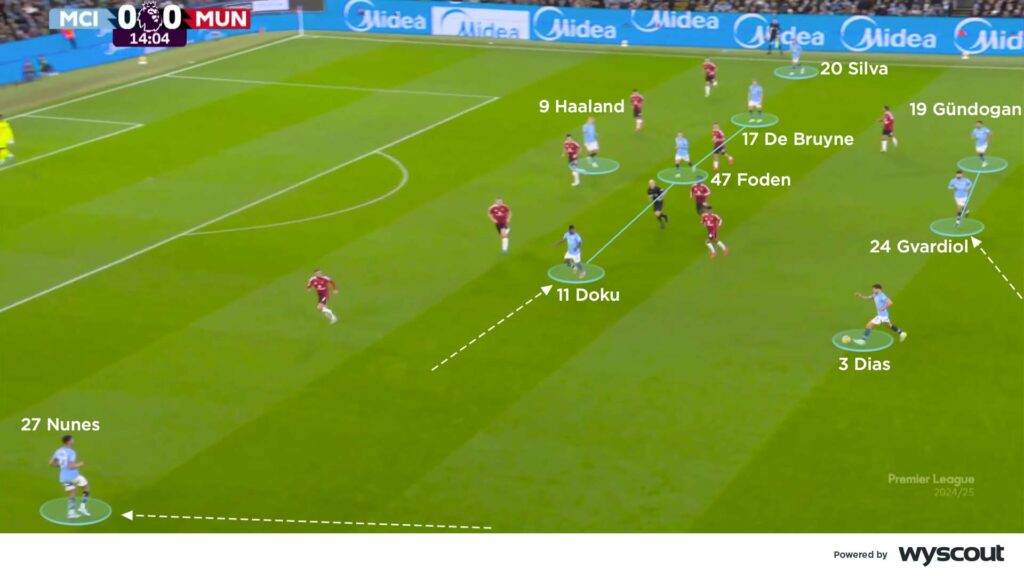
The home side struggled initially to break down Manchester United’s 5-4 block, though. From deep, Gündogan then joined City’s next line, leaving Walker and Dias to support underneath Gvardiol and protect against Rasmus Højlund. Four City players were positioned between the lines, across the pitch, inside of Silva and whoever was holding the width on City’s left (below).
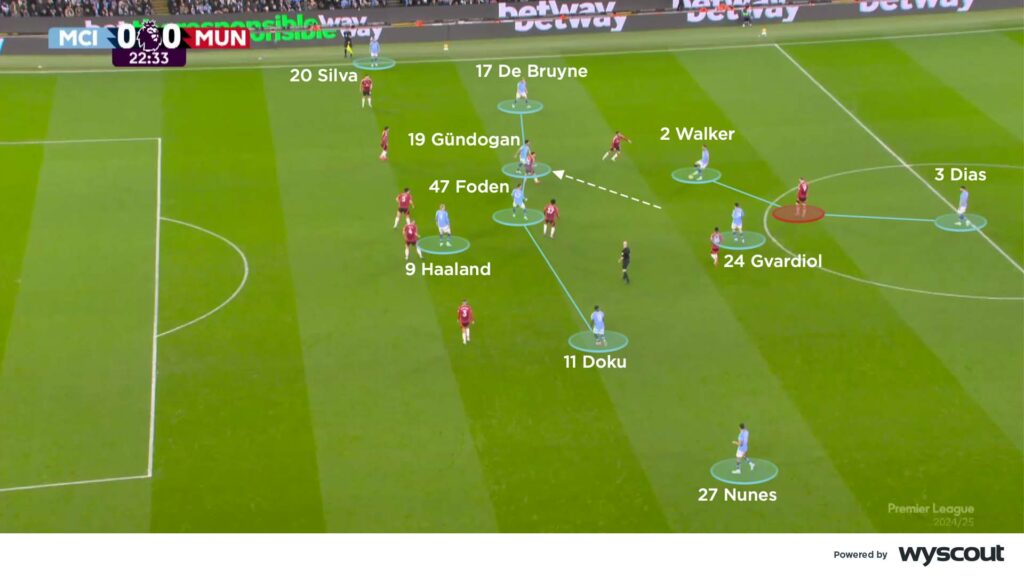
Some of their best combinations came in the central spaces, when Foden and De Bruyne worked off one another and were supported by Doku, Gvardiol and Gündogan. However, it took Gvardiol’s header from a short-corner routine to secure an unconvincing half-time lead for City, who then failed to have a single shot on target in the entire second half.
A drawback of City’s new build-shape was the space available for United to expose on the counter-attack. With just Dias and Walker back, wide spaces were open for United to make forward runs and play passes into, exploiting before Gvardiol could recover back. As such, runs by number 10s Fernandes and Diallo, either side of Højlund, helped break City’s cover; Fernandes having moved higher when the injured Mason Mount was replaced by Kobbie Mainoo after 14 minutes. Right wing-back Noussair Mazraoui’s additional support also proved useful in these counter-attacking moments.
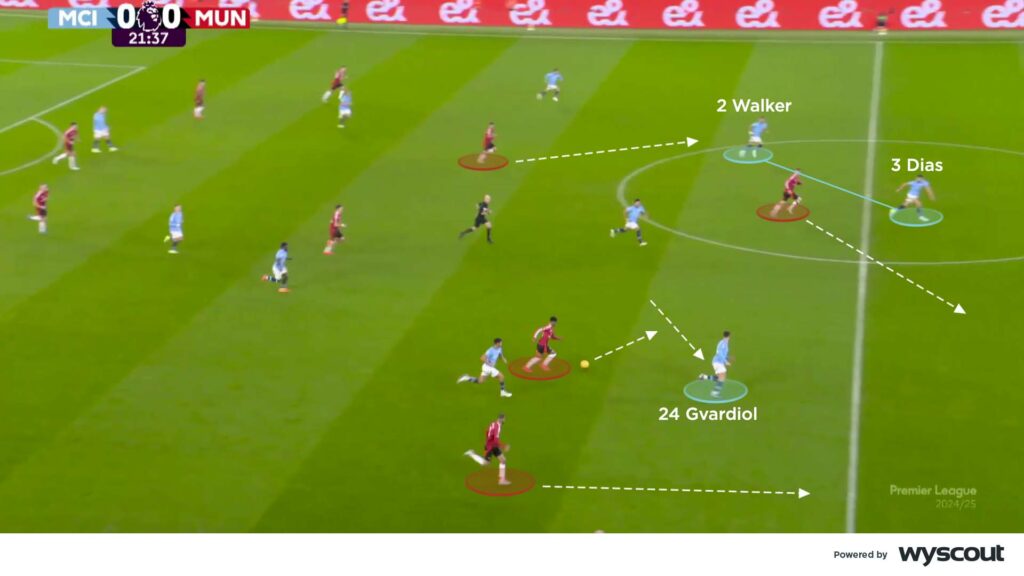
United in the wide areas
Manchester United’s 5-4-1 shape converted into a 3-4-2-1 when attacking, and they made good use of the wide areas in the first half. With City using a narrow 4-4-2 when defending deep – and an unconvincing 4-3-3 when pressing in the middle third – United’s switches of play found their wing-backs (below). They could then connect with number 10s Diallo and Fernandes. Although City’s narrow-midfield protected direct access into United’s number 10s and Højlund, play via the wide areas started exposing their deepening block.
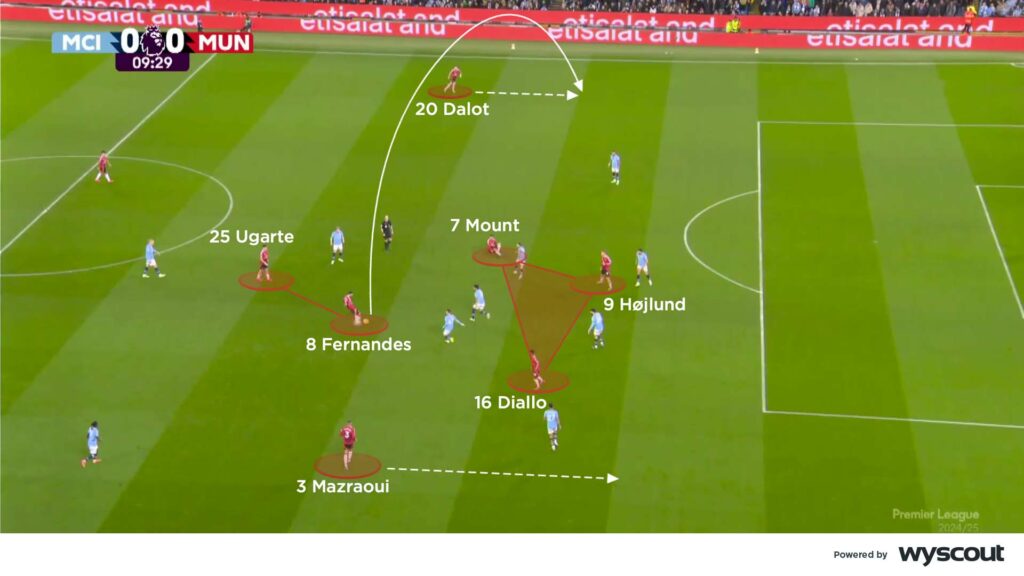
Continued switches of play helped United progress forward – with play from left to right proving most effective, exposing Doku’s press. He was often lured out to Matthijs de Ligt – or a deeper Mazraoui – which forced Foden to move across, in turn abandoning his central-covering role. This created central gaps for United’s midfield to receive the ball inside City’s block, pulling Nunes out of the back line. From here, overlapping runs from Mazraoui from deep – or inside-channel runs from Diallo – penetrated City’s stretched block (below).
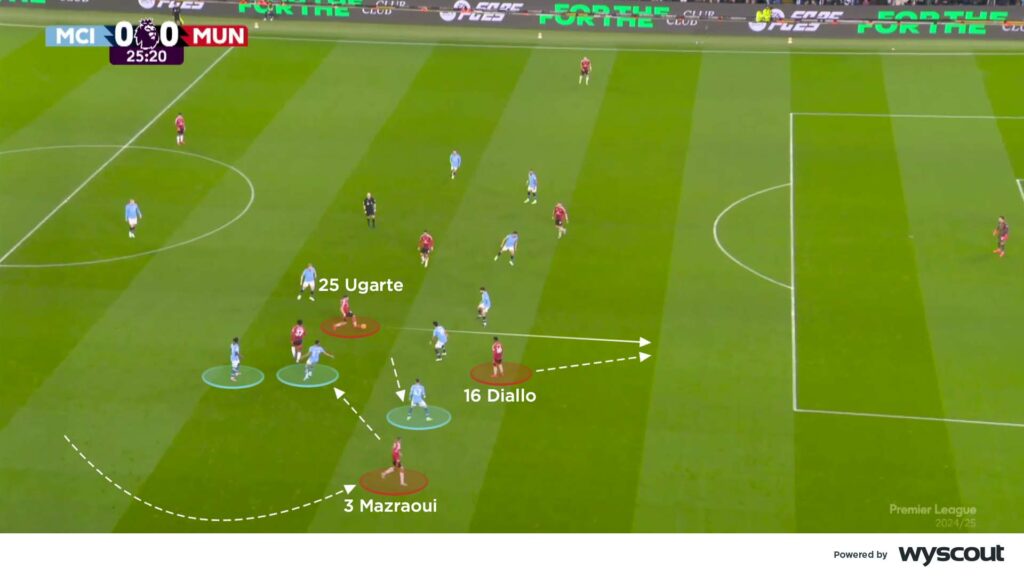
In the second half, City defended for longer periods in a more reserved block, with United having much more of the ball. The visitors were less penetrative, but still looked to switch the play from left to right. Switches from Harry Maguire and Lisandro Martínez worked the ball into Diallo and Mazraoui (below), while left-side rotations within the midfield unit helped keep possession before working the ball to the wide-right duo. Further rotations between Diallo and Mazraoui attacked City’s unconvincing left side – attacking around for crosses or inside for combinations – as United regularly entered the final third.
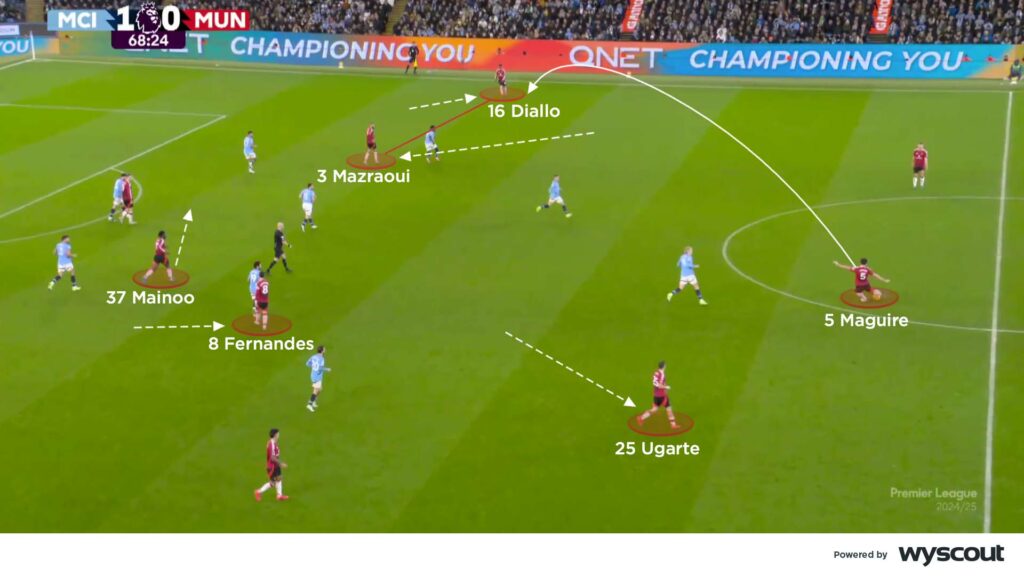
United’s right-side continued to threaten via switches, but also from any middle-third regain. Diallo’s ball carrying and Mazraoui’s driving from deep helped United penetrate into City’s half, with Højlund dropping off to secure, hold and link play. Opposite runs from Fernandes (below) or Mainoo penetrated in-behind, or broke City’s adapted central-midfield cover.
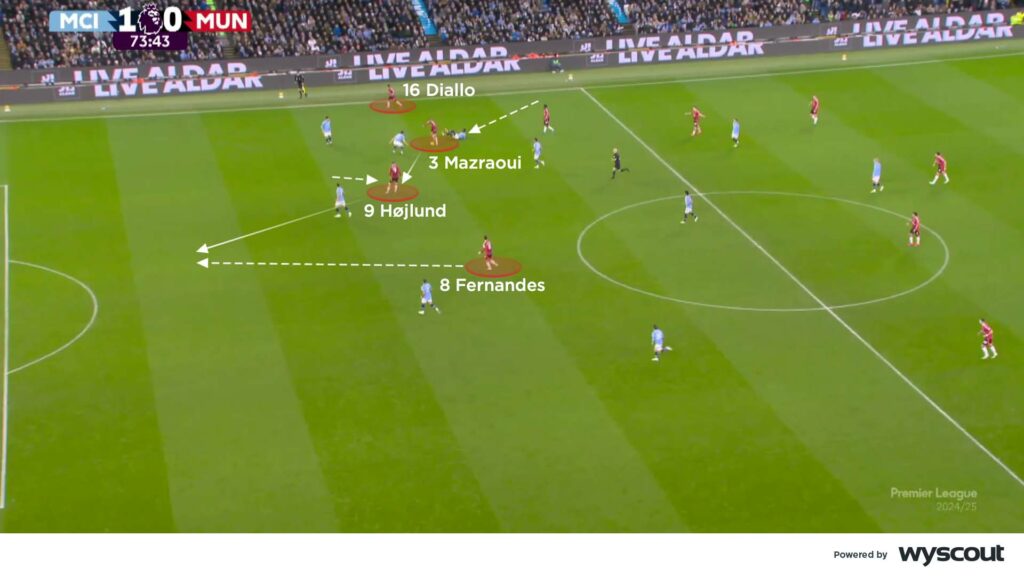
Fernandes wasted an opportunity (above) to equalise after 73 minutes, when he was 1v1 against Ederson, only to lift wide. Diallo, however, won the penalty for Fernandes to convert 15 minutes later, before finishing superbly for the winner. As United’s most effective player throughout the second half, it was fitting that he should prove to be the match winner. For City and Guardiola, it is back to the drawing board, after an eighth defeat in 11 games in all competitions.
To learn more about football tactics and gain insights from coaches at the top of the game, visit CV Academy


